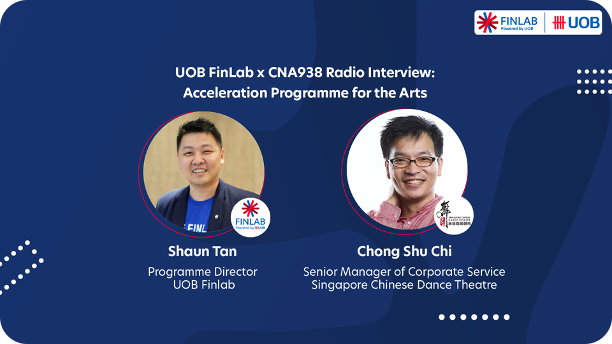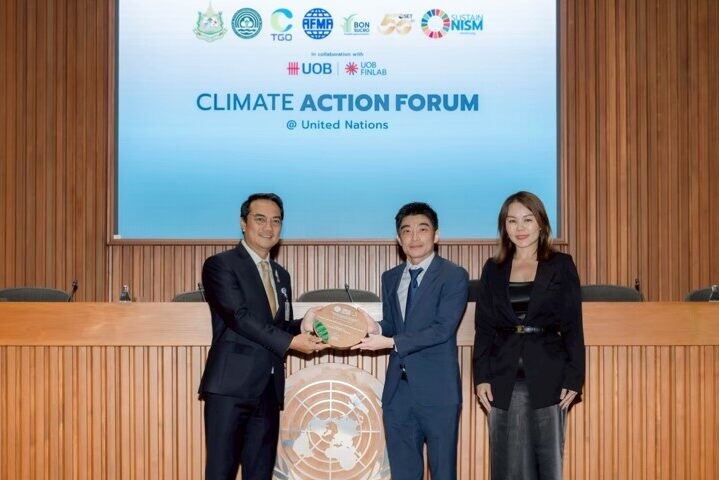
Upskilling: A Key Strategy to Futureproof SMEs in a Digital and Sustainable Economy
Upskilling is the key for SMEs to thrive in a digital and sustainable economy—and UOB FinLab is here to make it happen.

The Acceleration Programme for the Arts 2023 by UOB FinLab and National Arts Council, aims to help arts organisations strengthen their business and digital capabilities to achieve their vision for growth and development.
In this interview with Stanley Young and and Tiffany Ang from CNA 938, Shaun Tan, Programme Director at UOB FinLab and Chong Shu Chi, Senior Manager of Corporate Service at Singapore Chinese Dance Theatre (SCDT) speak about the challenges that arts organisations faced during the COVID-19 pandemic and how digital tools can help them improve their competitiveness post-pandemic.
What made your theatre company decide to be part of this program? Why is it important for your organization?
However, the project cost for this could be as high as putting up a physical show. Furthermore, only a handful of our customers were willing to pay to consume a digital performance, compared to a physical one. So, as such, SCDT has to think of ways to explore this new medium to create new works while at the same time, helping our company remain sustainable.
What are some of these takeaways that you were able to bring back to your team?
I think the most important thing shared would be the business model canvas as we learned that most of, in fact all, the departments are interlinked and that a decision made will affect the entire company. So, these are the things that as an artist felt relatively new to us.
Stanley Young:
Hello, I’m Stanley Young with Tiffany Ang. Thank you for joining us here on CNA 938. During the height of the COVID-19 pandemic, one of the worst affected sectors was the arts industry. Back then, live theatre events, concerts, arts, and exhibitions were put on hold causing financial strain on many artists and arts organizations, and although they managed to pivot to online shows and content, it just wasn’t enough to pull in audiences and advertisers. That dark period may seem like a long time ago, but live performances, concerts, and other mass events have since resumed last year and following the pandemic, the National Arts Council has joined hands with Singapore leader and lender UOB to help their arts community be more financially resilient.
The FinLab, which is UOB’s Innovation accelerator, will run the UOB NAC acceleration program. It was launched on 14 March to equip arts organizations and artists with skills in business finance, business management, and digital marketing. Let’s find out more, shall we? Joining us now is Shaun Tan, Program Director at the FinLab, and Chong Shu Chi, who is the Company Manager of the Singapore Chinese Dance Theatre. Shaun and Shu Chi, thank you for joining us.
Shaun Tan:
Hi Stanley and Hi Tiffany!
Stanley Young:
Welcome to our program today, Shaun. Let’s begin with you. Let’s find out about this program. Why launch such a program to equip artists with business and as well as digital capabilities? Was it mainly sparked by what happened during the pandemic?
Shaun Tan:
Yes. So firstly, I’d like to say that UOB has been championing Southeast Asian art and artists in the region for over the past four decades, including running our flagship UOB Painting of The Year competition and supporting art development in Singapore. So as part of our efforts to support the arts community, we signed an MOU with NAC last year for a strategic partnership to develop financial and business competency for the Singapore Arts community and support the development of a vibrant arts scene. So, the acceleration program for the arts is one of the key initiatives under this partnership.
So as you know, during the pandemic artists and arts groups have been affected greatly, resulting in irregular income and shrinking patronage as they need to have a better understanding of their finances and learn how to manage their business more effectively.
Tiffany Ang:
Shaun, what is the profile of the artists and the art organizations you are targeting? Are we looking at younger artists and smaller art organizations, who could be maybe more in need of financial help
Shaun Tan:
Okay, so, for this first cohort, we are targeting arts organizations. So, we have a good mix of arts groups across performing arts, visual arts, as well as literary arts. So for the open call, we had more than 50 art groups that signed up. We have selected 20, arts groups for this cohort, mainly they have to be open-minded and keen to transform digitally.
Stanley Young:
All right, so you said 20 arts groups among which would be I assume the Singapore Chinese Dance Theatre, and that’s why we have Shu Chi to be able to share with us as well. Now, Shu Chi, what made your theatre company decide to be part of this program? Why is it important for your organization?
Chong Shu Chi:
I think before I start let me just share a bit more about our company. We are Singapore Chinese Dance Theatre. In short, we are a professional dance company that promotes Chinese through artistic and creative excellence. I mean, like any other sector, Singapore arts was deeply affected by the impact of the global pandemic. So during this time, we felt that digitalization and technology are the only way we can sustain ourselves and maintain our reach with new and existing audiences.
So this is very crucial. It was a crucial time for us to work on upscaling and building capability when the restrictions were in place. So, at the beginning of the global pandemic, when all physical activities were put to a stop, we can only stream our past production, which was not meant to be released online to the public. So subsequently, we have managed to put up hybrid performances, reaching new audiences beyond our show. And as we get more comfortable with digital technologies, we collaborated with filmmakers to produce a dance film and VR dance last year. So, these are some of the few events that were beyond our imagination, especially for the Chinese dance company here.
However, the project cost for this could be as high as putting up a physical show. Furthermore, only a handful of our customers were willing to pay to consume a digital performance, compared to a physical one. So, as such, SCDT has to think of ways to explore this new medium to create new works while at the same time, helping our company remain sustainable.
Tiffany Ang:
Shu Chi, you are the Company Manager of the Singapore Chinese Dance Theatre. What are Some of the challenges you faced? Would you say the finance and the business aspect is the most difficult for example, you know, security, securing funding, cost-cutting? You know, that is one of the main challenges that you would have as the company manager.
Chang Shu Chi:
We want to continue to focus on, you know, creating a presence in the industry. So we put up, for example, what I shared earlier like you putting up a performance but the cost is as high as a physical one. That’s the reason why we feel that there is a little bit more that we can do to transform those digital consumers into a physical audience that supports the company and supports the arts.
Stanley Young:
We are hearing more about the Singapore Chinese Dance Theatre, one of the arts organizations that are currently enrolled in the FinLab, which is the UOB innovation accelerator, they run the UOB NAC acceleration program, and joining us from the FinLab is its Program Director, Shaun Tan, and as you heard a while ago, SCDT is the Company Manager, Chong Shu Chi. Now Shaun, coming back to you. Give us an idea as to the sort of business workshops that are currently being offered to the arts organizations.
Shaun Tan:
We worked closely with NAC to put together a four-week program. In these four weeks, we will provide tools, knowledge, and resources for participants participating to build up their business acumen, giving them a head start in widening their visibility among audiences as well as stakeholders. We have invited an arrangement of experienced artists as well as industry experts from local mixed media artists, to galleries, to tech experts, as well as marketing specialists as our workshop trainers and panel speakers. So, we wanted to tap into their expertise and experiences to help the artists and arts groups.
So, we included the first UOB Painting of the Year winner and Cultural Medallion artist Mr. Goh Beng Kwan and his daughter, Deputy Director of Digital Innovation and Transformation of the National Gallery of Singapore, Kevin Lim, as well as the Managing Director (MD) of Meta Singapore, Damien Kim. So, these are the few speakers that we have in our program.
Tiffany Ang:
I understand that there will also be a session each week for participants to network with fellow artists and business leaders. How Important is networking within the art sector?
Shaun Tan:
These networking sessions are a key element in our program as both FinLab and NAC, believe that this is important for the artists and arts groups to share their stories and learn from one another.
So, we hope these networking sessions will spark collaboration between the various arts groups and they will become advocates for one another. So, other than sharing and meeting the arts community, participants will also have the opportunity to network with experienced business leaders who can offer a different perspective from outside of the arts industry on commercializing products and building a sustainable business for these arts organizations.
Stanley Young:
All right, Shu Chi, I mean this is about collaboration as well. I wonder what sort of collaborations SCDT has done so far? Whether it’s with another arts organizations, or other artists outside of your group, or even non-performing arts organizations.
Chang Shu Chi:
I mean, as I said earlier, we have worked with filmmakers to explore the new medium, which is dance film. This is very new in Singapore, especially if you put it in the Chinese dance context. So other than that, we also worked with the VR company. We converted one of our past productions into a VR work, where the audience has to put on the gear to view the dancers just right in front of them. So, these are some of the collaborations that we have done earlier.
Stanley Young:
Okay. So having been part of these this program that I believe started on 14 March, what have you learned so far from this program? By the way, how long does it run?
Chang Shu Chi:
It runs six sessions over four weeks, so I think we have been introduced to the business model canvas and some business and marketing strategies for creatives. So, these helped us to gain more insight into business development and digital marketing and improved the overall capability of some of our companies. And more importantly, I think, this program allowed us to take a step back to think about the values of Chinese dance and how they can be perceived as a necessity, instead of an option in the current society.
Stanley Young:
Yes, artists are essential.
Tiffany Ang:
During the pandemic, I was also one of the audiences to watch some of these plays that were there were online, and it allowed us to still enjoy the arts even though we were all cooped up at home. So, in a way, it was how the arts sector pivoted from live performances, Right? Live physical performances and I enjoyed that.
Shaun going back to you. We’re saying that you know, it started mid-March, and it will conclude next Tuesday. So, this is after six sessions or for over four weeks, right? What’s the feedback so far from the participants? What sort of things are they saying, did people ask if they wanted more of it?
Shaun Tan:
So far the response and feedback from the arts groups have been very positive. I’m very glad the idea has shown enthusiasm. They are a very energetic group of participants and they chit-chat with one another even during the coffee breaks and lunch breaks. In fact, some of them have commented they have many takeaways that they have to bring back and share with their team from their respective organization. So I guess these are just some very encouraging signs.
Tiffany Ang:
What are some of these takeaways, Shu Chi that you were able to bring back to your team?
Chang Shu Chi:
I think the most important thing to share would be the business model canvas as we learned that most of, in fact all, the departments are interlinked and that a decision made will affect the entire company. So, these are the things that as an artist felt relatively new to us. These were the takeaways that I felt were benefiting the arts companies.
Stanley Young:
Yeah. Well Shaun, the program’s second run, I believe it’s going to be happening in the second half of this year. Will it be the same program as this inaugural run that’s ongoing or will it be different? Will it target a different group because you talked about how the current one is meant for arts organizations, right? Is the next one going to be for artists? How does it work?
Shaun Tan:
Okay, the second run will be for the self-employed art individuals. But before that, we will do a review of this first run with NAC in April and see what went well and what can be improved. We will also sit down and brainstorm on content that will be more relevant to the individual artists, and we aim to share more details of the open call by June.
Stanley Young:
So, is this a free program that any artist, or arts organization can register for? Are there any qualifying criteria?
Shaun Tan:
This is a free program. So, a lot of effort and budget has been put in to make this program meaningful, and beneficial for the arts organizations as well as individuals.
Tiffany Ang:
Now, are there any qualifying criteria that you must meet to be able to participate in the second run?
Shaun Tan:
No. As long as they are an artist in Singapore and as I said, we try to keep a very wide range of domain of artists be it in performing arts, visual arts, or even traditional Arts. So do come forth and apply. In fact, for the second one, we are looking at 50 individuals. So we are hoping for a bigger class.
Stanley Young:
Alright. So some listeners may be individual artists, or independent artists, who may be interested after hearing about this program and have piqued their interest to register for the second round. How can they find out more? Is there a website for the FinLab?
Shaun Tan:
Yes. You can visit thefinlab.com as well as the website of NAC. Details will be shared on our website as well as social media.
Stanley Young:
Okay. Got it. thefinlab.com or nac.gov.sg
That’s Shaun Tan, Program Director at the FinLab. And we’ve been hearing from Chong Shu Chi, who is the Company Manager of the Singapore Chinese Dance Theatre, who is also attending the first inaugural run of this program by the NAC who are joining hands with UOB for the UOB NAC Acceleration Program. The FinLab is UOB’s innovation accelerator.


Upskilling is the key for SMEs to thrive in a digital and sustainable economy—and UOB FinLab is here to make it happen.

UOB FinLab in Thailand has been conferred the prestigous Climate Action Award 2025 for its efforts in combating climate change

Learn about the key sustainability trends UOB FinLab is focusing on for 2025.

Designed for business owners to enhance their digital capabilities through practical learning, this programme takes businesses to the next level.
Designed for business owners to enhance their digital capabilities through practical learning, this programme takes businesses to the next level.


Bridge ideas and innovation, subscribe to the FinLab Connect now!